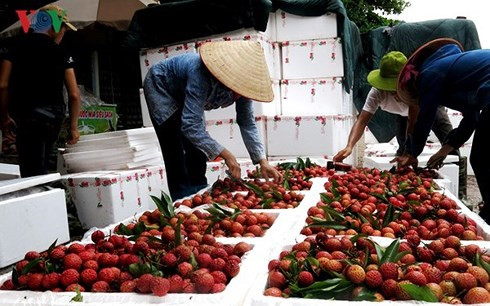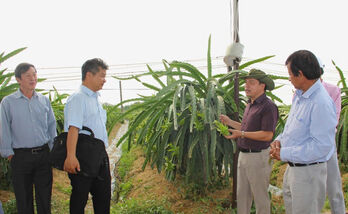
According to the Ministry of Industry and Trade, Vietnam’s fruit and vegetable exports reached US$330 million in July, up 1.2% compared to the previous month but down 7.5% on the same period last year, bringing the total exports for the first seven months of 2018 to US$2.32 billion, a year-on-year rise of 14.6%.
Although China and the US were biggest consumers of Vietnamese fruit and vegetables up to July, with import values of US$1.47 billion and US$61.9 million respectively, exports to both markets show signs of stagnation in comparison to the activity seen over the same period last year.
Despite there being a general trend toward growth in exports of fruit and vegetables, many economists predict the US-China trade war to have a negative impact on Vietnam’s exports of agricultural products in the near future. The belligerent trade stances held by the two biggest importers of Vietnamese fruit and vegetables will affect other countries’ exports of products to these markets.
Agricultural experts said that farm products from China will have to find alternative markets to compensate for the loss of trade resulting from the US’ increase of import duties on Chinese goods. With their plentiful supply and cheap prices, Chinese fruit and vegetables will add ever fiercer competition to Vietnamese products.
In response to US tariff hikes, China has raised import duties to 25% on US farm produce such as fruit, poultry and beef. To avoid exposure to the tariff, more US farm produce is likely to enter the Vietnamese market.
The impacts of the US-China trade war will lead to a decline in Chinese exports. As a result, China will find new export markets for its agricultural products and increase domestic consumption, resulting in a fall in imports, which will have a knock-on effect on Vietnam’s fruit and vegetable exports to China.
Advantage in adversity, the way forward for agriculture
In order to boost exports of agricultural products such as fruit and vegetables, Nguyen Van Viet, head of the Planning Department under the Ministry of Agriculture and Rural Development (MARD), says the MARD will continue the transition from cultivating low productivity rice to other crops such as fruit, vegetables and flowers using advanced technology to boost production and respond to market demands from now to the end of this year.
In addition, the ministry will step up the use of higher quality plant varieties and apply advanced technologies and mechanization to reduce the cost of production and increase the quality, value and competitiveness of each fruit and vegetable.
Regarding the country’s export growth, Vu Tien Loc, chairman of the Vietnam Chamber of Commerce and Industry (VCCI), said that although there wasn’t a fall in value, the national rate of export growth is declining month by month. Hurdles are popping up in export channels to some major markets, especially agricultural products, which demonstrates the real world impacts of the US-China trade war.
The Minister of Industry and Trade, Tran Tuan Anh, has admitted that the country’s exports will face considerable difficulties due to the prolonged trade conflict between the US and China. Typically, countries impose stronger safeguard measures and tighten regulations on food hygiene and safety and environmental protection, causing difficulties for domestic export products on import markets.
A number of obstacles and difficulties are awaiting domestic export products, particularly agricultural products including fruit and vegetables which are key export products.
The MOIT has urged businesses to stay abreast of market developments, and raise the quality of export products to meet the more stringent regulations and standards of importers.
The many free trade agreements which Vietnam has entered are facilitating the opening of new markets for the fruit and vegetable sector, offering a good opportunity for businesses to reduce their dependence on single markets.
As a matter of importance, it is necessary for businesses to intensify coordination models to ensure the quality of exported fruit and vegetables./.
VOV
 Collective economy—a sustainable direction to escape poverty
Collective economy—a sustainable direction to escape poverty



